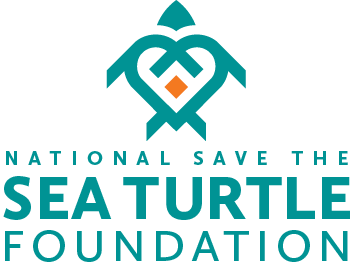The National Save The Sea Turtle Foundation Supports Florida Gulf Coast University
Dr. Phil Allman
Associate Professor of Vertebrate Zoology
Florida Gulf Coast University
Associate Professor of Vertebrate Zoology
Florida Gulf Coast University
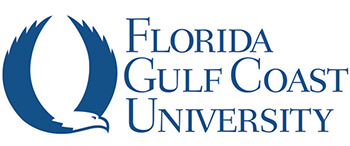
The National Save The Sea Turtle Foundation recently established a scholarship program for students at Florida Gulf Coast University, located in Fort Myers, Florida. The scholarships will support senior-year undergraduate students by covering expenses related to tuition, books and fees, and provide additional support for Dr. Phil Allman’s sea turtle research and conservation projects.
Florida Gulf Coast University and Dr. Allman’s FGCU Herpetology Research Lab provide opportunities for students interested in sea turtle research and conservation. Dr. Allman has been working on international and domestic turtle conservation issues for over 25 years and is a member of the IUCN Tortoise and Freshwater Turtle Specialist Group as well as the IUCN Marine Turtle Specialist Group. As a US Fulbright Scholar, he initiated the first long-term sea turtle tagging and research program in Ghana (West Africa). Thirteen years later he continues to direct a network of sea turtle monitoring programs as part of the Ghana Turtle Conservation Project. The project enables undergraduate and graduate students from FGCU and the University of Ghana to obtain valuable field experience while conducting conservation-based sea turtle research.
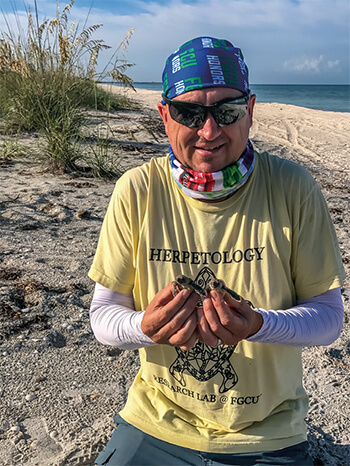
In 2010, a group of 12 undergraduate students from FGCU participated in a Study Abroad program where they interviewed fishermen along Ghana’s coast. This research allowed us to discover many coastal communities consider it taboo to harm or even touch a sea turtle. The origin of this traditional protection is based on an oral story about sea turtles saving fishermen lost at sea during a storm. One of the undergraduate students became fascinated with this information and helped write a peer reviewed paper on the study – she was the primary author. Another student from a 2012 Study Abroad program helped publish a paper documenting loggerhead nesting activity in Ghana – a species that had not been seen in the region since the 1950s. FGCU students helped initiate a fishery observer program in Ghana to determine how many sea turtles are accidently killed as by-catch in the artisanal gill-net fishery. Over 12,000 gill-net fishing vessels operate in Ghana’s water and research indicates 4 sea turtles are killed per vessel each year. Olive ridley sea turtles are the most commonly captured, but these nets also kill a significant number of leatherback and green sea turtles.
In 2016, the lab initiated an experiment to test the effectiveness of using green LED lights to reduce sea turtle by-catch. Three years of data indicate green lights reduce sea turtle captures by 80% in Ghana’s gillnet fishery. Because of the taboo against harming sea turtles fishermen are excited to use the green lights. Dr. Allman is leading another Study Abroad program in 2020 and hopes to install lights on more fishing boats with a goal of having lights on all boats in two fishing communities (approximately 350 boats). Over 40 students at FGCU have participated in sea turtle research activities in Ghana, and many have continued conservation work through graduate research activities, Peace Corp, and even the US Fulbright program. Graduate students have also participated in sea turtle research activities in Ghana by exploring nesting patterns and population genetics among the species. We recently discovered that leatherback turtles are not only genetically similar to populations in Gabon and South Africa, but also to those of the Caribbean and US. An important study just completed in the lab provides genetic support for Archie Carr’s hypothesis that olive ridley sea turtles colonized the Atlantic Ocean from the Indian Ocean. Theses genetic studies helped the IUCN Marine Turtle Specialist Group delineate sea turtle conservation management units as a tool of prioritizing conservation efforts where the most work is needed.
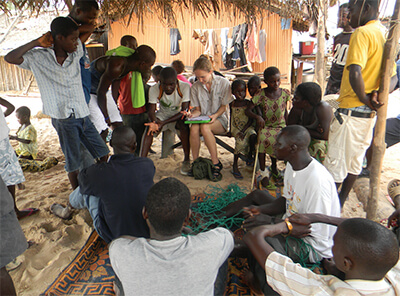
Dr Allman’s team works with the people of Ghana’s coast
to establish sustainable practices for the long-term
protection of sea turtles.
to establish sustainable practices for the long-term
protection of sea turtles.
The lab will continue implementing conservation strategies in Ghana while simultaneously researching the animals to learn how best to implement those efforts. For example, the lab hopes to continue working with Ghana’s fishermen to further explore the most efficient use of LED lights on gillnets, but also to develop gear modifications on other fishery types (purse seine, trawlers) in Ghana that may also catch large numbers of sea turtles. It is also important to investigate migration patterns of Ghana’s sea turtles through satellite telemetry studies. This information would allow the lab to initiate multi-nation agreements to protect sea turtles that utilize Ghana’s beaches.
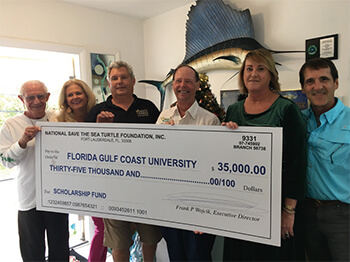
The National Save The Sea Turtle Foundation Team
is proud to support Florida Gulf Coast University.
is proud to support Florida Gulf Coast University.
The FGCU Herpetology Research Lab has recently been asked to provide oversight for sea turtle monitoring activities at Cayo Costa State Park (CCSP) through the Florida Park Service. CCSP is located in southwest Florida, on Cayo Costa Island in the Gulf of Mexico about 12 miles west of Cape Coral. It is known to host nesting populations of loggerhead and green sea turtles, and both Kemp’s Ridley and hawksbill turtles are found in nearby waters. Dr. Allman’s team will greatly augment the Florida Park Service’s abilities to study and preserve the Island’s sea turtle poulations. Four undergraduate students conduct daily morning nesting surveys and collect data using FWC and FPS protocols. Students have the opportunity to conduct their own independent research while working on Cayo Costa. A student is currently exploring the impact of coyote predation on sea turtle recruitment with hopes of improving predator control measures in the park. The Herpetology lab has only been involved at Cayo Costa for three years but the project will continue offering research opportunities for FGCU’s students. The lab hopes to investigate sand temperature and changes in nesting patterns to explore how climate change is impacting the reproductive ecology of loggerhead sea turtles in southwest Florida.
Helping Sea Turtles Survive for 39 Years
A NON-PROFIT ORGANIZATION
State of Florida Registration Number CH-2841 | Internal Revenue Code 501 (c) (3)
Web Design & Development by Web Expressions, LLC
